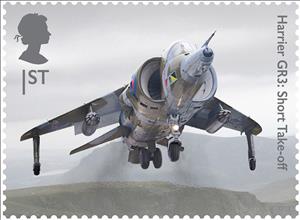Stamp: Harrier GR3 : Short Take Off (United Kingdom of Great Britain & Northern Ireland 2019)
Harrier GR3 : Short Take Off (United Kingdom of Great Britain & Northern Ireland 2019)
02 May (United Kingdom of Great Britain & Northern Ireland ) within release British Engineering (2019) goes into circulation Stamp Harrier GR3 : Short Take Off face value 1st No Face Value
| Stamp Harrier GR3 : Short Take Off in catalogues | |
|---|---|
| Colnect codes: | Col: GB 2019-06SSa |
Stamp is horizontal format.
stamp from souvenir sheet. Face value £0.67 on day of issueAlso in the issue British Engineering (2019):
- Stamp - Harrier GR3 : Vertical Landing face value 1.55;
- Stamp - Superconducting Magnet face value 1.60;
- Stamp - Harrier GR3 : Conventional Flight face value 1st;
- Stamp - Harrier GR3 : Short Take Off face value 1st;
- Se-tenant - Catalytic Converter/Crossrail face value 2*1.55;
- Stamp - Falkirk Wheel face value 1st;
- Souvenir Sheet - Harrier Jump Jet face value 4.50;
- Stamp - Harrier GR3 : Transition to Landing face value 1.55;
- Se-tenant - Raspberry Pi/Falkirk Wheel face value 2*1st;
- Stamp - Synthetic Bone Graft face value 1.60;
- Se-tenant - Magnet/Bone Graft face value 2*1.60;
- Stamp - Raspberry Pi face value 1st;
- Stamp - Catalytic Converter face value 1.55;
- Stamp - Crossrail face value 1.55;
Stamp Harrier GR3 : Short Take Off it reflects the thematic directions:
An aircraft (pl. aircraft) is a vehicle that is able to fly by gaining support from the air. It counters the force of gravity by using either static lift or the dynamic lift of an airfoil, or, in a few cases, direct downward thrust from its engines. Common examples of aircraft include airplanes, rotorcraft (including helicopters), airships (including blimps), gliders, paramotors, and hot air balloons.Part 1 (Definitions and Abbreviations) of Subchapter A of Chapter I of Title 14 of the U. S. Code of Federal Regulations states that aircraft "means a device that is used or intended to be used for flight in the air."
Engineers, as practitioners of engineering, are professionals who invent, design, analyze, build and test machines, complex systems, structures, gadgets and materials to fulfill functional objectives and requirements while considering the limitations imposed by practicality, regulation, safety and cost.The word engineer (Latin ingeniator, the origin of the Ir. in the title of engineer in countries like Belgium and The Netherlands) is derived from the Latin words ingeniare ("to contrive, devise") and ingenium ("cleverness"). The foundational qualifications of a licensed professional engineer typically include a four-year bachelor's degree in an engineering discipline, or in some jurisdictions, a master's degree in an engineering discipline plus four to six years of peer-reviewed professional practice (culminating in a project report or thesis) and passage of engineering board examinations.
An invention is a unique or novel device, method, composition, idea, or process. An invention may be an improvement upon a machine, product, or process for increasing efficiency or lowering cost. It may also be an entirely new concept. If an idea is unique enough either as a stand-alone invention or as a significant improvement over the work of others, it can be patented. A patent, if granted, gives the inventor a proprietary interest in the patent over a specific period of time, which can be licensed for financial gain.



